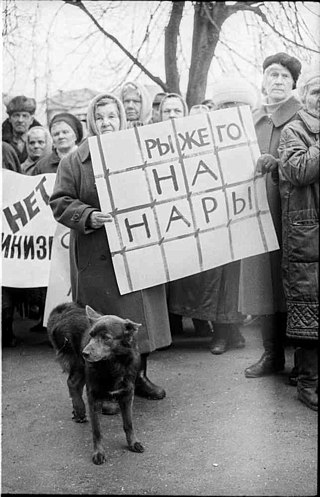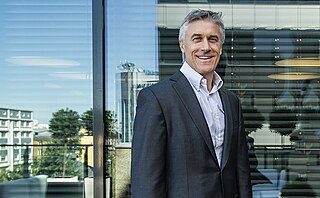Related Research Articles
Privatization can mean several different things, most commonly referring to moving something from the public sector into the private sector. It is also sometimes used as a synonym for deregulation when a heavily regulated private company or industry becomes less regulated. Government functions and services may also be privatised ; in this case, private entities are tasked with the implementation of government programs or performance of government services that had previously been the purview of state-run agencies. Some examples include revenue collection, law enforcement, water supply, and prison management.

The European Bank for Reconstruction and Development (EBRD) is an international financial institution founded in 1991. As a multilateral developmental investment bank, the EBRD uses investment as a tool to build market economies.

OJSC "Yukos Oil Company" was an oil and gas company based in Moscow, Russia. Yukos was acquired from the Russian government by Russian oligarch Mikhail Khodorkovsky's Bank Menatep during the controversial "loans for shares" auctions of the mid 1990s. Between 1996 and 2003, Yukos became one of the biggest and most successful Russian companies, producing 20% of Russia's oil output. In the 2004 Fortune 500, Yukos was ranked as the 359th largest company in the world. In October 2003, Khodorkovsky—by then the richest person in Russia and 16th richest person in the world—was arrested, and the company was forcibly broken up for alleged unpaid taxes shortly after and declared bankrupt in August 2006. Courts in several countries later ruled that the real intent was to destroy Yukos and obtain its assets for the government, and act politically against Khodorkovsky. In 2014, the largest arbitration award in history, $50 billion (€37.2 billion), was won by Yukos' former owners against Russia. This $50 billion award by the Permanent Court of Arbitration was ruled invalid by the District court in The Hague in 2016, but reinstated by the Court of Appeal of the Hague in 2020.

Mikhail Maratovich Fridman is a Ukrainian-born, Russian–Israeli tycoon. He is one of the co-founders of Alfa-Group, a multinational Russian conglomerate. According to Forbes, he was the seventh-richest Russian as of 2017, eventually moving down to eleventh-richest Russian in 2020. In May 2017, he was also ranked as Russia's most important businessman by bne IntelliNews. In August 2022, Fridman had a net worth of $11.2 billion, according to the Bloomberg Billionaires Index.

МММ was a Russian company that perpetrated one of the world's largest Ponzi schemes of all time, in the 1990s. By different estimates from 5 to 10 million people lost their savings. According to contemporary Western press reports, most investors were aware of the fraudulent nature of the scheme, but still hoped to profit from it by withdrawing money before it collapsed.

Andrei Shleifer is a Russian-American economist and Professor of Economics at Harvard University, where he has taught since 1991. Shleifer was awarded the biennial John Bates Clark Medal in 1999 for his seminal works in three fields: corporate finance, the economics of financial markets, and the economics of transition.
A private investment in public equity, often called a PIPE deal, involves the selling of publicly traded common shares or some form of preferred stock or convertible security to private investors. It is an allocation of shares in a public company not through a public offering in a stock exchange. PIPE deals are part of the primary market. In the U.S., a PIPE offering may be registered with the Securities and Exchange Commission on a registration statement or may be completed as an unregistered private placement.
Tiger Management Corp., also known as "The Tiger Fund", is an American hedge fund and family office founded by Julian Robertson. The fund began investing in 1980 and closed in March 2000/01. It continues to operate today in direct public equity investments and seeding new investment funds.
A financial crisis is any of a broad variety of situations in which some financial assets suddenly lose a large part of their nominal value. In the 19th and early 20th centuries, many financial crises were associated with banking panics, and many recessions coincided with these panics. Other situations that are often called financial crises include stock market crashes and the bursting of other financial bubbles, currency crises, and sovereign defaults. Financial crises directly result in a loss of paper wealth but do not necessarily result in significant changes in the real economy.
Robert Ward Vishny is an American economist and is the Myron S. Scholes Distinguished Service Professor of Finance at the University of Chicago Booth School of Business. He was the Eric J. Gleacher Distinguished Service Professor of Finance at the University of Chicago Booth School of Business.

AboveNet was a provider of high bandwidth telecommunication circuits primarily for large corporate enterprises and communications carriers in 17 markets in the United States and 4 markets in Europe. Its private optical network delivered key network and IP services and was used in financial and legal services, media, health care, retail, and government.

Simeon Dyankov is a Bulgarian economist. From 2009 to 2013, he was the deputy prime minister and minister of finance of Bulgaria in the government of Boyko Borisov. He has been a vocal supporter of Bulgaria's entry into the Eurozone. Before his cabinet appointment, he was the chief economist of the finance and private sector vice-presidency of the World Bank.
Sberbank CIB is a multinational investment banking and asset management firm headquartered in Moscow, Russia, and a subsidiary of Sberbank. It was founded in Moscow in 1991, and was formerly known as Troika Dialog.
Peter M. Halloran is the founder and CEO of Pharos Financial Group, an investment firm active in global markets since 1997. The firm was established with initial investment capital from Credit Suisse and Soros Fund Management. In 2014, Pharos added a Dallas-based investment arm, Titanium Exploration Partners LLC, to invest into U.S. Oil & Gas opportunities. Altogether, Halloran has brought over $10 billion to the markets in which he invests. He was awarded Hedge Fund Manager of the Year in 2010 by Hedge Fund World, and his Pharos Gas Investment Fund and Pharos Russia Fund have been both ranked among top-15 global performers by Bloomberg. He has never gated an investment, suspended an NAV or re-set a high water mark. In 2011, Halloran established the physical oil trading firm, Pharos Energy Ltd., which was then sold in 2014. In 2000, Halloran acquired a stake in Aton Capital Group and subsequently transformed it into a top emerging markets investment bank that was later sold to UniCredit Bank for $424 million.

Privatization in Russia describes the series of post-Soviet reforms that resulted in large-scale privatization of Russia's state-owned assets, particularly in the industrial, energy, and financial sectors. Most privatization took place in the early and mid-1990s under Boris Yeltsin, who assumed the presidency following the dissolution of the Soviet Union.
After the dissolution of the Soviet Union in 1991 and the end of its centrally-planned economy, the Russian Federation succeeded it under president Boris Yeltsin. The Russian government used policies of shock therapy to liberalize the economy as part of the transition to a market economy, causing a sustained economic recession. GDP per capita levels returned to their 1991 levels by the mid-2000s. The economy of Russia is much more stable today than in the early 1990s, but inflation still remains an issue. Historically and currently, the Russian economy has differed sharply from major developed economies because of its weak legal system, underdevelopment of modern economic activities, technological backwardness, and lower living standards.

The Moscow Exchange is the largest exchange in Russia, operating trading markets in equities, bonds, derivatives, the foreign exchange market, money markets, and precious metals. The Moscow Exchange also operates Russia's central securities depository, the National Settlement Depository (NSD), and the country's largest clearing service provider, the National Clearing Centre. The exchange was formed in 2011 in a merger of the Moscow Interbank Currency Exchange and the Russian Trading System.
The U.S. Russia Investment Fund (TUSRIF) was an investment fund from 1995 to 2008. It was established by the United States government to make private investments in the Russian economy. By 2005, it had invested $300 million in 44 Russian companies. James Cook, Managing Director, founded and developered two of the leading companies DeltaBank, the first bank to sell credit cards in Russia, and DeltaCredit, the first bank to sell residential mortgages in Russia. TUSRIF was replaced by the U.S. Russia Foundation (USRF) in 2008, while its financial arm, Delta Private Equity Partners, was purchased by Deutsche Bank in 2009.

Michael Calvey is an American businessman and one of Russia’s most prominent foreign investors. His criminal conviction on accusations of embezzlement caused widespread shock in Russia.

Christo Grozev is a Bulgarian investigative journalist and author. He is the lead Russia investigator with Bellingcat, focusing on security threats, extraterritorial clandestine operations, and the weaponization of information. His investigations into the identity of the suspects involved in the 2018 poisoning of Sergei and Yulia Skripal earned him and his team the European Press Prize for Investigative Journalism.
References
- 1 2 3 McKay, Betsy (March 1995). "Russia's Young Crusader Takes Aim at Factory Chiefs". The Wall Street Journal Europe.
- ↑ Carla Anne Robbins and Steve Liesman (August 1997). "Aborted Mission: How an Aid Program Vital to New Economy Of Russia Collapsed". The Wall Street Journal.
- ↑ Barry Newman (May 1996). "Rethinking an Empire". The Wall Street Journal.
- 1 2 Adi Ignatius (May 1995). "New Europe's Remarkable 20-Somethings". The Wall Street Journal.
- ↑ Fogel, Marya (October 1994). "Privatization: Moscow Targets New Fear Of Stock-Market Volatility". The Wall Street Journal Europe.
- ↑ Kranz, Patricia (April 1998). "Who Needs Rubles? The virtual economy hides a lot of business--and tax revenue". Business Week.
- ↑ Baker-Said, Stephanie (July 1997). "Yeltsin Takes Aim at Greedy Managers". The Moscow Times.
- ↑ Banerjee, Neela (November 1995). "Western Fund Managers Target Russia". The Wall Street Journal.
- ↑ Banerjee, Neela (March 1995). "Russian Factory Thrives After Outsider Steers Transition to Private Ownership". The Wall Street Journal Europe.
- ↑ "How Russian Industry Is Changing For The Better". The Economist. April 1995.
- ↑ Peter Galuszka and Patricia Kranz (February 1995). "Impatient Investors Go After Old-Guard Russian Managers". Business Week.
- ↑ Metromedia Sells Russian Assets Light Reading, April 3, 2003
- ↑ Is Russian Opportunity Knocking? Light Reading, April 9, 2003
- ↑ Kristine Petrosian (2001-02-10). "Russian firm is Adamant about e-book prospects". The Russia Journal (98). Archived from the original on 2011-06-13. Retrieved 2010-02-18.
- ↑ "Spiral Spreads to 80 Countries in 20 Weeks. Thanks, GWT!". Google Developers Blog. 2010-05-14.
- ↑ STI Acquires 3 Companies, Raises $3M edSurge, July 1, 2014
- ↑ Erlanger, Steven (August 1994). "Risks of Russia's Young Markets". The New York Times.
- ↑ McKay, Betsy (June 1996). "Russia's Gilded Age". The Wall Street Journal Europe.
- ↑ Kranz, Patricia (June 1997). "Shareholders At The Gate: Russian red directors dig in their heels as outside investors try to oust them". Business Week.
- ↑ Patricia Kranz and Peter Galuszka (May 1995). "Why State Capitalism May Just Be The Answer". Business Week.
- ↑ "Survey of Russia (4): Cash Stays Under The Bed". Financial Times. April 1995.
- ↑ "Where would Warren Buffett invest in Russia?". The Russia Journal (4). July 5, 1999. Archived from the original on January 4, 2010.
- ↑ Baker-Said, Stephanie (December 1997). "FUNDS for the FUTURE". The Moscow Times.
- ↑ "National Award Person of the Year - 1997". 1997.
- McKay, Betsy. Russia's New Tycoons. Newsweek. August 7, 1995.
- Peach, Gary. Andrei Volgin's Lonely Battle. Russia Review. Vol. 4, No. 5. March, 1997.
- Andrei Volgin Loves "to Make Money". Boston Sunday Globe. June 9, 1996.
- Carlsson, Lars; Lundgren, Nils-Gustav; Olsson, Mats-Olov (2001). "The Russian Detour: Real Transition in a Virtual Economy?". Europe-Asia Studies. 53 (6): 841–867. doi:10.1080/09668130120078522. ISSN 0966-8136. S2CID 153794137.